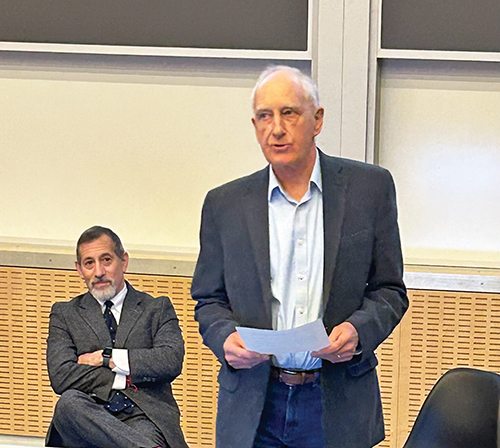
Bruce Hoffman.
A well regarded academic with decades of study in counterterrorism visited Rutgers University-New Brunswick on November 30 to share with faculty, students and members of the public what he has observed about the October 7 Hamas attacks against Israel. The event was sponsored by Rutgers Hillel along with several academic units.
Dr. Bruce Hoffman is a tenured professor at the Edmund A. Walsh School of Foreign Service at Georgetown University and a senior fellow for counterterrorism and homeland security at the Council on Foreign Relations. He is the author of many books, including “Inside Terrorism” and the forthcoming book, with Jacob Ware, “God, Guns, and Sedition: Far-Right Terrorism in America” (Columbia University Press).
The program started with a welcome by Rachel Zeidwerg, a member of the Rutgers Hillel student board, who stated that the event was held to “encourage conversations on important topics.” Rutgers Political Science Professor Dr. Eric Davis served as moderator.
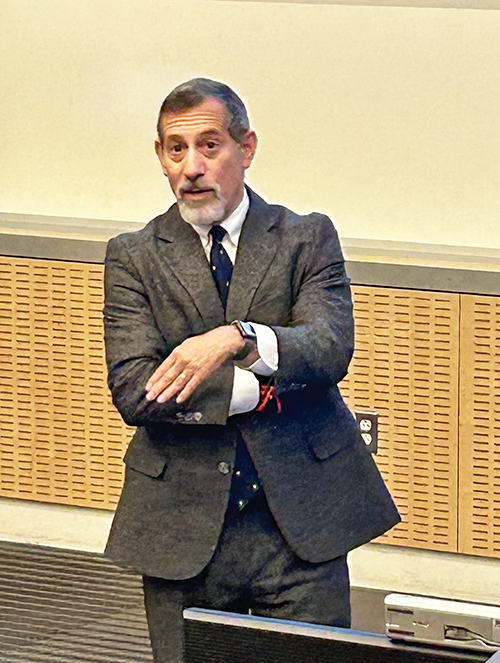
Before Hoffman could get too far into his talk, a group of roughly a dozen or so students (a few wearing masks and/or hijabs) got up to disrupt the program, accusing Hoffman of being “a war profiteer” and chanting, “Free, free Palestine” and “From the river to the sea, Palestine will be free.” Members of the Rutgers University Police Department who were stationed in the lecture hall promptly ushered out the agitators.
Hoffman started his talk with three key questions: What is the enduring significance of the October 7 attacks? Whose side now is time on? And what are the long-term implications for regional security and counterterrorism?
He noted that for Israelis and Jews everywhere, the attacks “were without precedent” and that “only during the Holocaust were more Jews killed on a single day.” By comparison, he stated that 317 people were killed in the surprise attack on the first day of the Yom Kippur War on October 7, 1973; and 127 people were killed in the massacre at Kfar Etzion over two days in May 1948, just prior to the War of Independence.
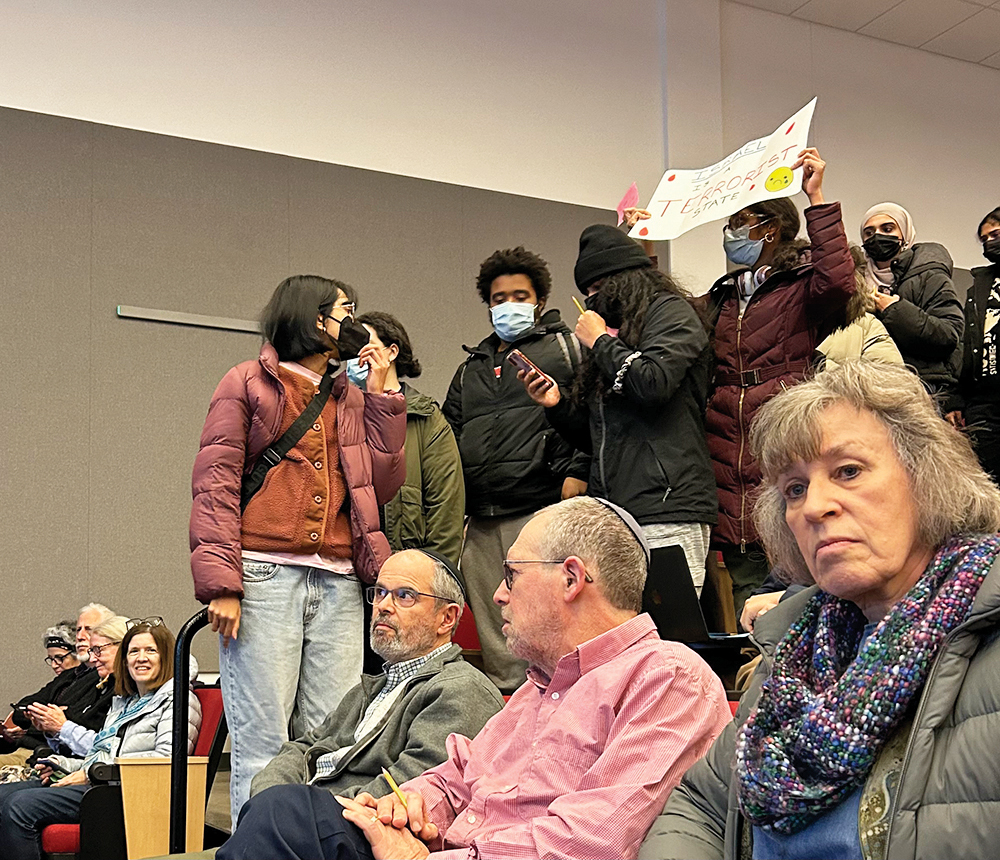
Hoffman pointed out the”astonishing success of the swarming tactics” used by Hamas on October 7, 2023, which included a sustained rocket barrage, armed terrorists on paragliders, terrorists breaching the separation barrier, speedboats and frogmen off the coast of Ashdod, and the seizure of 243 hostages. He asserted that while al-Qaeda and the Tamil Tigers have a similar operational capacity, only Hamas in this attack coordinated all these assaults at the same time.
Hoffman noted that Hamas’ actions in the October 7 attack clearly conform with the values in their covenant of 1988 and their revised charter of 2017, both of which call for the complete destruction of Israel, express disdain for any negotiated settlement, see violence as essential to the liberation of Palestine, and embrace blatantly antisemitic views of Jews.
He asserted that time appears to be on Hamas’ side right now, as Israel must work cautiously to destroy the tunnel networks and the range of destruction and the casualty counts in Gaza continue to rise. He added that as the war drags on, Israel faces the dangers of both political conflict since their “sclerotic governance was already paralyzed” and the real possibility that the economy will be negatively impacted, with 360,000 workers mobilized for the war.
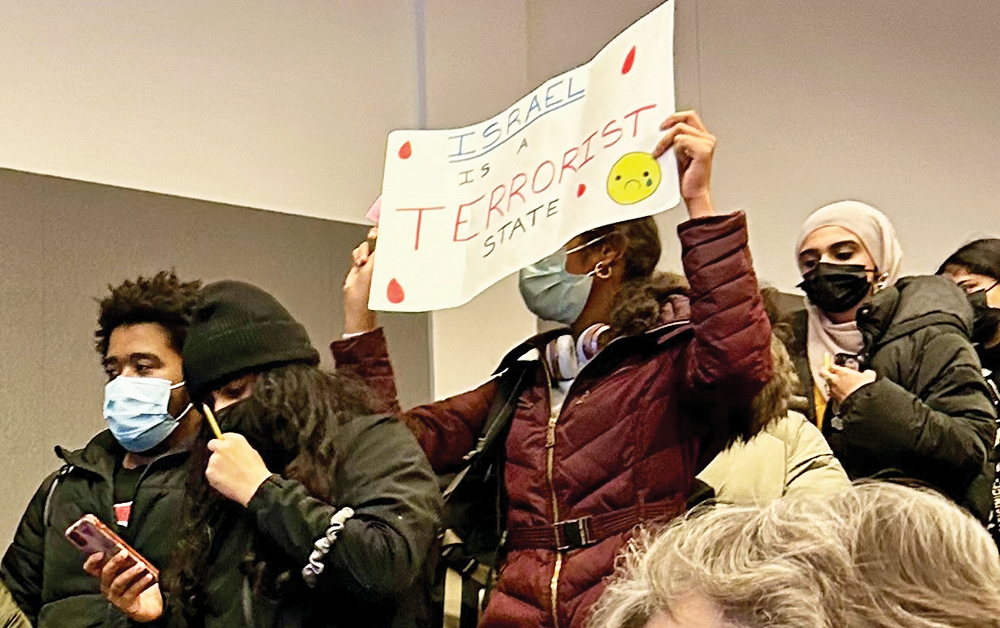
Hoffman suggested that the multi-day cease-fire will likely prolong the conflict, as it stopped the IDF from aerial surveillance and gave Hamas a chance to regroup. One positive sign he sees is that the Abraham Accords have held up despite the conflict. He also said that Hamas receives scant government support from the Arab and Islamic world, outside Iran and Qatar.
In the view of Hamas, Hezbollah and Iran, time is on their side because they believe that the United States, the West and Israel only appear strong but are really weak, materialistic, distracted and dysfunctional. He cited a public comment by Hassan Nasrallah in 1996: “Israel is a spider-web society: it looks strong from the outside, but touch it and it will fall apart.”
Hoffman stated that “the first casualty when war comes is the truth” and discussed the damaging reactions Israel faced when Hamas asserted that it bombed the al-Ahli hospital in Gaza. Only weeks later did Human Rights Watch publish a report, which received less attention, that contradicted Hamas’ assertions.
In terms of longer-term impacts for counterterrorism, Hoffman asserted that the IDF’s image of strength and intelligence is now shattered, the Oct 7 attacks serve as a model for terrorists worldwide, and they validate Iran’s regional strategy.
The professor shared that in an interview he conducted with Yasser Arafat in March 2000, the Palestine Liberation Organization chairman stated that Hamas could only exist with Syrian and Iranian support and that (at the time) only 10% of Palestinians were hardcore Hamas and Palestine Islamic Jihad supporters. Hoffman added that Arafat, who returned to Gaza after the Oslo Accords, said in an interview with him in May 1998 that “Hamas’ military activity is [designed] to undermine the peace process.”
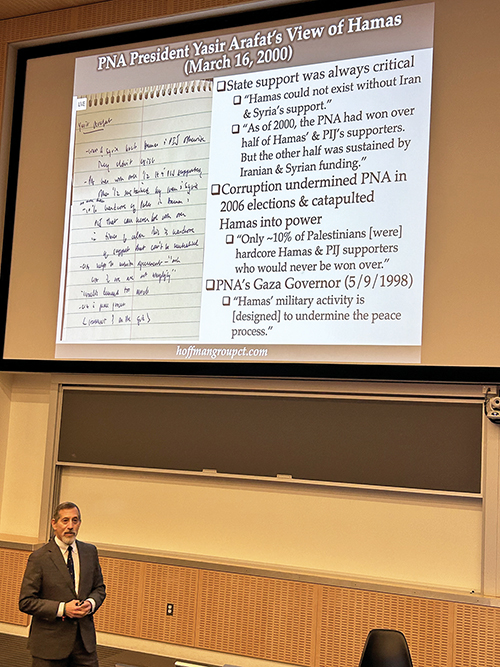
After Hoffman’s Power Point presentation and talk, he responded to questions from the audience. He stated that in his view, the “two-state solution” is the only viable solution to the conflict and that the U.S. can only marginalize extremists in the region by working closely with other Arab countries. To decrease Iranian influence, he said that the U.S. must tighten sanctions, stop allowing American citizens to visit Iran, and “stop this fruitless search for moderates.” Asked why Hezbollah didn’t get heavily involved in the current conflict, Hoffman said that Iran wouldn’t let them, that the presence of two U.S. battle carriers deterred them, and that Lebanon’s economy “is a basket case,” which has resulted in a steep drop in the terrorist group’s popularity.
Commenting after the event, Jenny Mandelbaum, professor emerita in the department of communication, said: “Professor Hoffman was clear about the goals of Hamas, the blatant antisemitism of its founding charter. It is important to get these facts on the table, and to further acquaint people with the history of the Middle East. I was very disappointed that the pro-Palestinian attendees chose to disrupt Professor Hoffman’s talk after only 10 minutes, rather than listening respectfully and engaging civilly.”
Harry Glazer is the Middlesex county editor of The Jewish Link. He can be reached at harryglazer615@gmail.com








